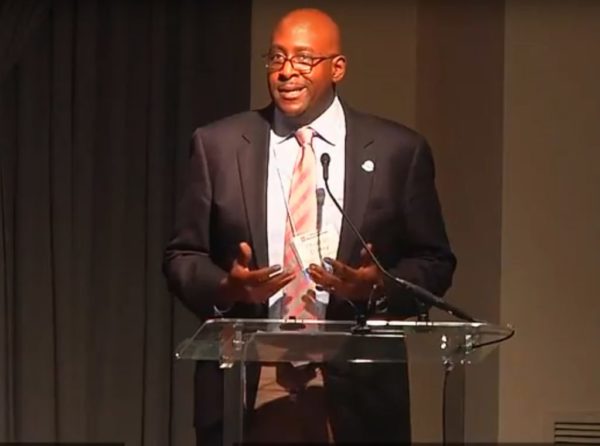County Board Vice Chair Christian Dorsey is urging people around Arlington to embrace density in their communities and abandon the idea of “protecting” certain neighborhoods from development.
Without that sort of shift in mentality, Dorsey expects the county will never meet its stated goals of bringing down housing costs and making Arlington more accessible for people of all income levels.
“We have to look inward and look at ourselves and some of the things that are holding us back,” Dorsey told the audience at last month’s annual Leckey Forum put on by Arlington’s Alliance for Housing Solutions. “We can’t kid ourselves into thinking we can have it both ways, to tout our progressive bonafides with housing and affordability while also accepting the framework that certain neighborhoods need to be protected. Ask ourselves: protected from what?”
Dorsey would concede that he doesn’t want to “change in any way the notion that neighborhoods are for people who want to grow their families and stay in Arlington for generations.”
But he did challenge people in wealthier neighborhoods to consider that fighting against more dense development often amounts to “preserving a level of unaffordability and segregation” that already exists across the county.
“Often, you hear, ‘We want to mitigate density, we want to concentrate density in certain areas, we want density to be something that we don’t deal with,” Dorsey said. “If that’s our framework and our paradigm, we are losing a key tool to deal with affordability.”
In the past, some critics have charged that the county is facilitating the overdevelopment of affordable housing in places like the western end of Columbia Pike while exempting large swaths of affluent North Arlington from more affordable development.
Dorsey sees the constant churn of redevelopment of small, single-family homes into ever larger homes on the same property as helping to contribute to this problem, arguing that “the whole idea that we have one dwelling per lot and we allow for the increase in footprint on said lots, that absolutely factors into our affordability challenge.”
“It restricts housing supply and increases the pricing of housing on those parcels,” Dorsey said.
Dorsey acknowledges that forcing this sort of shift in attitudes won’t be easy, however, and he lamented that “the pursuit of effective public policies to achieve these outcomes are often thwarted by political considerations.”
Yet he also has hope that “these considerations… are not immutable,” and he believes people in the county will prove to be receptive to his arguments, if they’re framed correctly.
“What I hear as often as, ‘We want to protect our neighborhoods and mitigate density,’ is that ‘I want my neighborhood to be a place where I can interact with people of diverse backgrounds, I want my kids to go to school where they interact with people from diverse communities and diverse life experiences,'” Dorsey said. “We need to hold people to that, and engage them on those levels and expose them to tools to actually make that a reality.”


